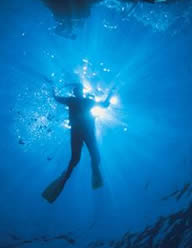 Featured Companies
|
Taking Scuba Diving Classes
Finding Classes You don’t actually have to get in the water to take the first class. Or at least, you can take classes and learn instruction of the tools, but then practice in a pool. For people who live in the Midwest, it would be impossible to find a body of water that was warm enough to swim in during half of the year, let alone pay attention to instruction. Classes are taught in community rec pools, colleges, even at high schools that have pools in them. To find a class, you simply can search on the Internet or look for a certified instructor in the phonebook. You can call the instructor and see what classes they have coming up. You could also find a location with a pool, such as a college, and see if they have any scuba diving classes offered on their website. Community education programs might come out with a listing every semester, so you could also see if the class was being offered then. Another way to find classes or instructors is to ask around. Have any of your friends recently learned how to dive? Ask who they used and if they liked the instructor before you book a class with them as your teacher. Classes will probably last a couple of hours long and last for six to eight weeks. Figuring out the equipment is a complicated process, so it needs to be learned inside and out, especially with the regulators and breathing devices, so you don’t have any problems underwater and have a hard time getting oxygen to your system. Taking the time to learn it the right way might be time consuming, but it could be invaluable to your life. Taking Advanced Classes Once you know the basics of scuba diving and have tried it out several times, you can take advanced classes on techniques. Advanced classes might be for people who want to go on deeper dives or for ones who are looking for something specific. Maybe they want to know how to look for underwater treasure or maybe they just want to research aquatic animals a bit more. Only people who have gone on many dives and logged several hours’ worth of underwater time will be allowed to progress on to advanced classes. Comments for this post are closed |